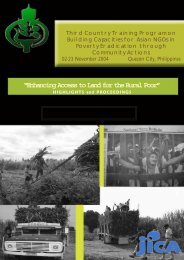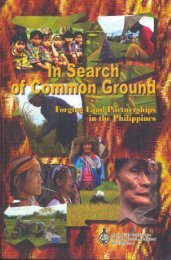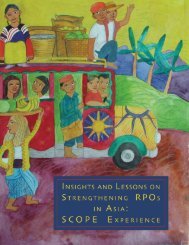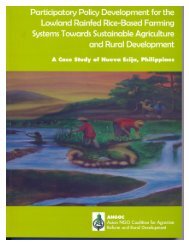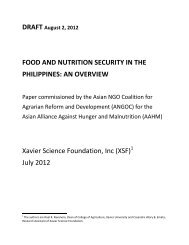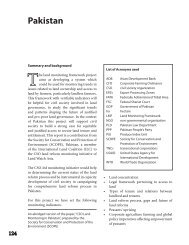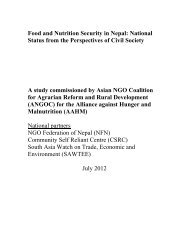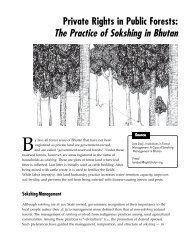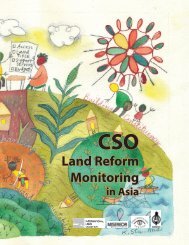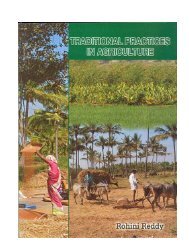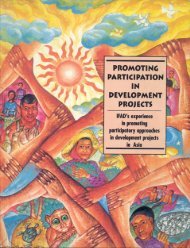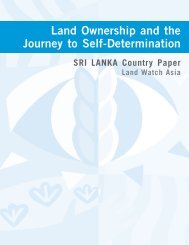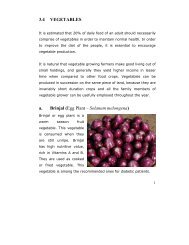Securing the Right to Land FULL - ANGOC
Securing the Right to Land FULL - ANGOC
Securing the Right to Land FULL - ANGOC
You also want an ePaper? Increase the reach of your titles
YUMPU automatically turns print PDFs into web optimized ePapers that Google loves.
include <strong>the</strong> poor in all decision-making processes. O<strong>the</strong>r rights,<br />
especially collective land rights, in regard <strong>to</strong> indigenous communities,<br />
need <strong>to</strong> be considered.<br />
<strong>Land</strong> demarcation has also led <strong>to</strong> many technical problems that<br />
work <strong>to</strong> <strong>the</strong> advantage of rich and powerful individuals. Donor<br />
organizations have reported that many demarcation projects are<br />
conducted all over <strong>the</strong> country using different technical systems<br />
of mapping and demarcation.<br />
The registration process has proceeded <strong>to</strong>o slowly, and has<br />
tended <strong>to</strong> concentrate on non-disputed areas, when it should<br />
be prioritizing areas where land grabs and illegal operations<br />
have been reported. ELCs are allegedly prioritized over SLCs,<br />
which benefit <strong>the</strong> poor, and <strong>the</strong> former are sometimes allotted<br />
in areas that should be awarded <strong>to</strong> indigenous peoples through<br />
a collective title.<br />
The parallel and overlapping operations of <strong>the</strong> Cadastral Commission,<br />
<strong>the</strong> court, and <strong>the</strong> National Authority of <strong>Land</strong> Dispute<br />
Resolution (NALDR) have resulted in many legal ambiguities.<br />
At <strong>the</strong> eighth meeting of <strong>the</strong> Government–Donor Committee<br />
in Oc<strong>to</strong>ber 2006, <strong>the</strong> Ambassador of Germany, Pius Fischer<br />
demanded that “its [NALDR’s] relationship and jurisdiction visà-vis<br />
<strong>the</strong> cadastral commissions and <strong>the</strong> courts be clarified, as<br />
<strong>the</strong> lack of clarity is causing general legal concerns.” The NGO<br />
Statement on <strong>the</strong> Moni<strong>to</strong>ring of CG Indica<strong>to</strong>rs (June 2006)<br />
also raised <strong>the</strong> concern that <strong>the</strong> NALDR might be undermining<br />
“<strong>the</strong> capacity of existing judicial institutions mandated <strong>to</strong> resolve<br />
land disputes.”<br />
O<strong>the</strong>r problems that are indicative of poor land governance are<br />
as follows:<br />
Inconsistencies between different State demarcation and<br />
registration processes;<br />
Slow and difficult process of identifying land for community<br />
forestry that would be covered by social land concessions<br />
(SLCs);<br />
Lack of transparency in <strong>the</strong> allocation and moni<strong>to</strong>ring of<br />
ELCs by <strong>the</strong> Ministry of Agriculture, Forestry and Fisheries<br />
(MAFF);<br />
Overlapping among different categories and uses of land,<br />
forestry, and fishery resources in <strong>the</strong> Tonle Sap; and<br />
Lack of clarity of <strong>the</strong> status of State land which has been<br />
grabbed by both rich and poor individuals.<br />
OVERCOMING A FAILURE OF LAW AND POLITICAL WILL<br />
65<br />
Insufficient Implementation of <strong>the</strong> <strong>Land</strong> Law<br />
There is general agreement on <strong>the</strong> “progressive character” of<br />
<strong>the</strong> <strong>Land</strong> Law of 2001. However, this law and its supporting subdecrees<br />
have yet <strong>to</strong> be fully implemented. NGOs in Cambodia<br />
report that only 10–20% of <strong>the</strong> law has been enforced.<br />
For example, Article 5 of <strong>the</strong> <strong>Land</strong> Law of 2001 provides protection<br />
against eviction and, where eviction is unavoidable, fair<br />
compensation, for <strong>the</strong> evictees. In 2005, more than 70 families<br />
were illegally and forcibly evicted from Koc Pich Island, Phnom<br />
Penh, in <strong>the</strong> Tonle Bassac River. The island would be developed<br />
as a “satellite city,” and <strong>the</strong> land was valued at US$25 per square<br />
meter. After a long negotiation with <strong>the</strong> residents of <strong>the</strong> island,<br />
<strong>the</strong> latter agreed <strong>to</strong> sell <strong>the</strong>ir land at US$5.25 per square meter,<br />
and <strong>the</strong>reafter left <strong>the</strong> island. O<strong>the</strong>r families were able <strong>to</strong> get<br />
US$12 per square meter.<br />
Article 18 and 19 of <strong>the</strong> <strong>Land</strong> Law of 2001 set a ceiling of 10,000<br />
hectares for concessions. However, <strong>the</strong> government continues<br />
<strong>to</strong> grant ELCs for areas that are beyond <strong>the</strong> mandated ceiling.<br />
Ano<strong>the</strong>r sub-decree of <strong>the</strong> <strong>Land</strong> Law of 2001 that has yet <strong>to</strong> be<br />
adopted by <strong>the</strong> government is that which recognizes and provides<br />
for <strong>the</strong> registration of <strong>the</strong> land rights of indigenous peoples.<br />
Lack of Access <strong>to</strong> <strong>Land</strong> as a<br />
Determinant of Poverty<br />
Farming households that own a hectare of land, or less, are unable<br />
<strong>to</strong> earn enough income for subsistence. In Cambodia, 40%<br />
of households own less than 0.5 hectare.<br />
Women and female-headed households are especially vulnerable<br />
<strong>to</strong> poverty. Women make up half of Cambodia’s agricultural<br />
workforce. The <strong>Land</strong> Law of 2001 provides that land titles be put<br />
under <strong>the</strong> name of both spouses, and that land sales must be<br />
approved by husband and wife. However, such legal protections<br />
often prove <strong>to</strong> be ineffectual in a patriarchal society which subjugates<br />
women’s rights <strong>to</strong> those of <strong>the</strong> men. Hence, portions of<br />
jointly owned property are routinely sold without <strong>the</strong> woman’s<br />
knowledge or assent.<br />
The increasing incidence of landlessness and near-landlessness<br />
among <strong>the</strong> rural poor, combined with <strong>the</strong> latter’s diminishing<br />
access <strong>to</strong> common property resources, especially forests, which<br />
ASIAN NGO COALITION FOR AGRARIAN REFORM AND RURAL DEVELOPMENT



